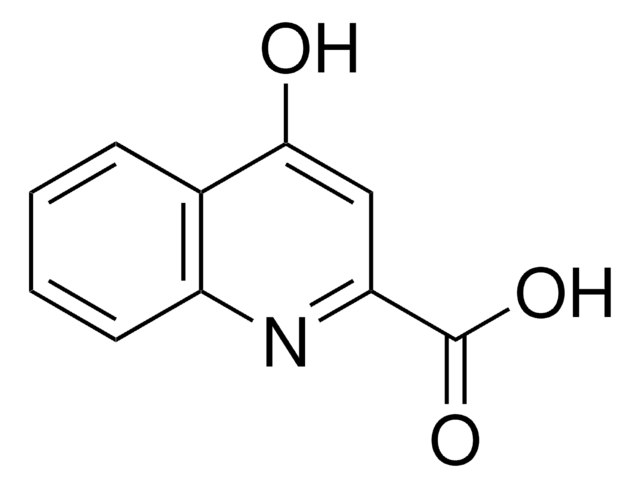73063
Alanine Dehydrogenase, recombinant
recombinant, expressed in E. coli, ≥15 U/mg
Sign Into View Organizational & Contract Pricing
All Photos(1)
About This Item
Recommended Products
recombinant
expressed in E. coli
form
crystals
powder
specific activity
≥15 U/mg
storage temp.
−20°C
Application
Alanine dehydrogenase (ald) is an oxidoreductase that is involved in taurin/hypotaurine metabolism and CO2 fixation. It is used in various enzyme assays and in kinetic studies .
Biochem/physiol Actions
Alanine dehydrogenase catalyzes the reversible reductive amination of pyruvate using NADH as an oxidation/reduction cofactor .
Unit Definition
1 U corresponds to the amount of enzyme which converts 1 μmol L-alanine per minute at pH 10.0 and 30°C (NAD as cofactor).
Signal Word
Danger
Hazard Statements
Precautionary Statements
Hazard Classifications
Resp. Sens. 1
Storage Class Code
11 - Combustible Solids
WGK
WGK 3
Certificates of Analysis (COA)
Search for Certificates of Analysis (COA) by entering the products Lot/Batch Number. Lot and Batch Numbers can be found on a product’s label following the words ‘Lot’ or ‘Batch’.
Already Own This Product?
Find documentation for the products that you have recently purchased in the Document Library.
M T Smith et al.
The Journal of biological chemistry, 268(15), 10746-10753 (1993-05-25)
The kinetic mechanism of alanine dehydrogenase from soybean nodule bacteroids was studied by initial velocity experiments with or without product inhibitors, dead-end inhibitors, or alternate substrates. Without inhibitors, double-reciprocal plots of initial velocity experiments showed intersecting lines, indicating a sequential
Xueli Zhang et al.
Applied microbiology and biotechnology, 77(2), 355-366 (2007-09-18)
Escherichia coli W was genetically engineered to produce L: -alanine as the primary fermentation product from sugars by replacing the native D: -lactate dehydrogenase of E. coli SZ194 with alanine dehydrogenase from Geobacillus stearothermophilus. As a result, the heterologous alanine
A Sinem Ozyurt et al.
Proteins, 72(1), 184-196 (2008-01-25)
This study describes a method to computationally assess the function of homologous enzymes through small molecule binding interaction energy. Three experimentally determined X-ray structures and four enzyme models from ornithine cyclo-deaminase, alanine dehydrogenase, and mu-crystallin were used in combination with
Roxane Lahmi et al.
Journal of bacteriology, 188(14), 5258-5265 (2006-07-04)
Degradation of the cyanobacterial light-harvesting antenna, the phycobilisome, is a general acclimation response that is observed under various stress conditions. In this study we identified a novel mutant of Synechococcus elongatus PCC 7942 that exhibits impaired phycobilisome degradation specifically during
Daniel Agren et al.
Journal of molecular biology, 377(4), 1161-1173 (2008-02-29)
L-alanine dehydrogenase from Mycobacterium tuberculosis catalyzes the NADH-dependent reversible conversion of pyruvate and ammonia to L-alanine. Expression of the gene coding for this enzyme is up-regulated in the persistent phase of the organism, and alanine dehydrogenase is therefore a potential
Our team of scientists has experience in all areas of research including Life Science, Material Science, Chemical Synthesis, Chromatography, Analytical and many others.
Contact Technical Service







